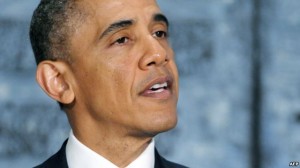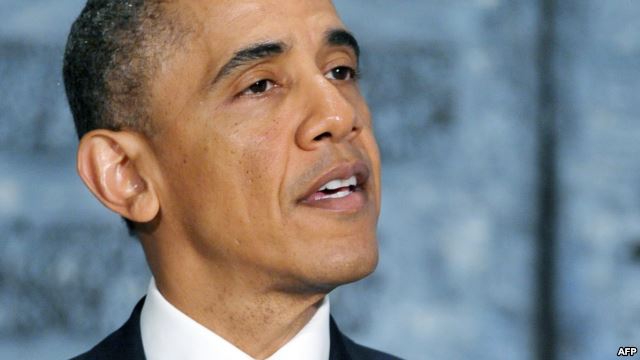 Tehran and Washington have exchanged messages over the crisis in Syria, according to comments made by Iranian Foreign Minister Mohammad Javad Zarif.
Tehran and Washington have exchanged messages over the crisis in Syria, according to comments made by Iranian Foreign Minister Mohammad Javad Zarif.Zarif was quoted on September 9 as saying that the two sides have been in communication about what�s happening in Syria, Iran's main regional ally.
At a news conference to mark the end of his visit to Iraq, where he reaffirmed Iran's opposition to possible U.S. military strikes against the Syrian regime over its alleged use of chemical weapons, Zarif answered a question about whether Iran and the United States would hold direct talks on the crisis.
Iranian�news agencies said�Zarif replied, "Currently there is no such intention."
But he added that the two countries had already exchanged messages and, if needed, would continue "in the same manner." He did not give further details.
His comments came amid speculation in Iranian media that U.S. President Barack Obama recently sent a letter to Iranian President Hassan Rohani.
Those reports were mainly sparked by a visit to Iran late last month by Oman's Sultan Qaboos that coincided with a trip to Tehran by the United Nations' undersecretary for political affairs, former U.S. Assistant Secretary of State Jeffrey Feltman.
Oman has in the past played the role of mediator between the United States and Iran, which severed ties following the 1979 revolution and the abduction of U.S. diplomats.
Mehrzad Boroujerdi, director of the Middle Eastern Studies program at Syracuse University, told RFE/RL that the two visitors could have acted as messengers between Tehran and Washington.
"There were two important visitors in Iran -- one a former U.S. official who's now serving the UN and then the Sultan of Oman -- and the rumor mill in Tehran seem to indicate that both of these gentlemen might have carried messages back and forth between Iran and the U.S., which is not inconceivable considering the U.S. interests, wanting to make sure that Iran doesn't do anything crazy when it comes to the Syrian conflict," Boroujerdi said.
Following the two high-level visits, Zarif remained vague when he was asked whether Obama had sent a letter to Rohani.
"It is possible that messages have been sent to [Iran's] president verbally or through other means," Boroujerdi said. "Messages that are sent publicly will be answered publicly. Messages or interpretation of� the United States' views that have been transferred to us through meetings have received an adequate response in the same meetings," he�told the semiofficial Mehr news agency.
Over the weekend, the�irannuc.ir website�reported on what it said was the content of the alleged letter from Obama, citing two "informed sources" in Tehran.
The report, which was reposted by a number of other news sites, claimed the letter did not contain any new issues and reiterated past U.S. positions, including readiness to hold direct talks on the nuclear issue and the need for Iran to create trust over its nuclear program.
Some countries accuse Iran of�hiding a nuclear weapons development program, a charge that Tehran denies.
The report said Tehran has sent a response to the letter.
National Security Council spokeswoman Caitlin Hayden told RFE/RL that the NSC does not discuss presidential correspondence.
Iran and the United States have reportedly exchanged messages in the past through the Swiss Embassy in Tehran, which represents U.S. interests, and also via other channels.
Zarif said last week in�an interview�with the weekly "Aseman" that Tehran informed Washington last December that chemical weapons, including Sarin gas, were being transferred to Syria, and that "extremist groups" might be planning to use the chemical agents.
He said the official memo was sent via the Swiss Embassy. It wasn't clear from his comments whether Washington responded.
While Iran appears to believe that Syrian rebels could have been behind last month's�suspected chemical attack in Syria, the United States has blamed the Syrian regime.
The two sides are also known to have conducted secret talks in the past on issues such as the situations in Iraq and Afghanistan.
Alireza Nader, a senior Iran analyst at the Rand Corporation, told RFE/RL that if the United states wants a political settlement on Syria, "Iran must be involved one way or another, whether it�s through direct or indirect negotiations."
He said Tehran needs to back the positive signals it has been sending with action.
By Radio Free Europe/Radio Liberty
The Iran Project is not responsible for the content of quoted articles.











